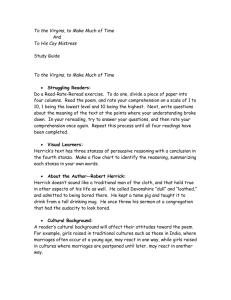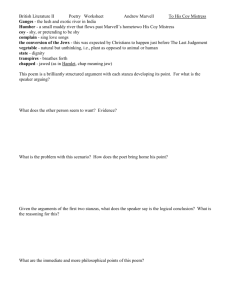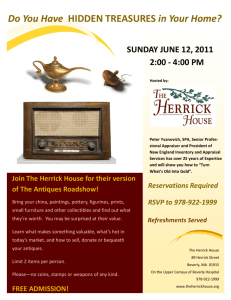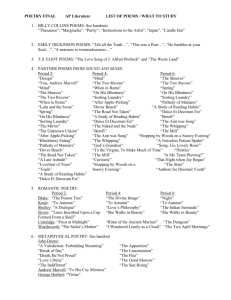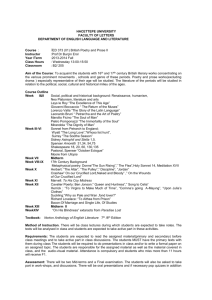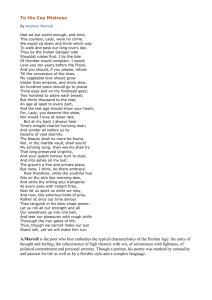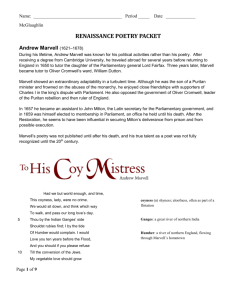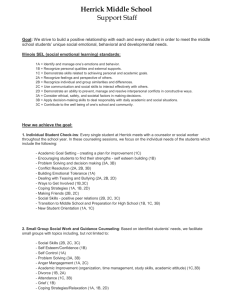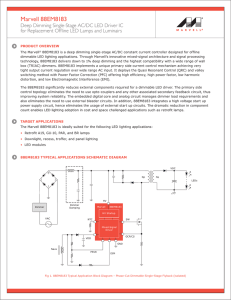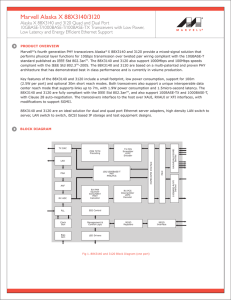Carpe Diem Poetry
advertisement
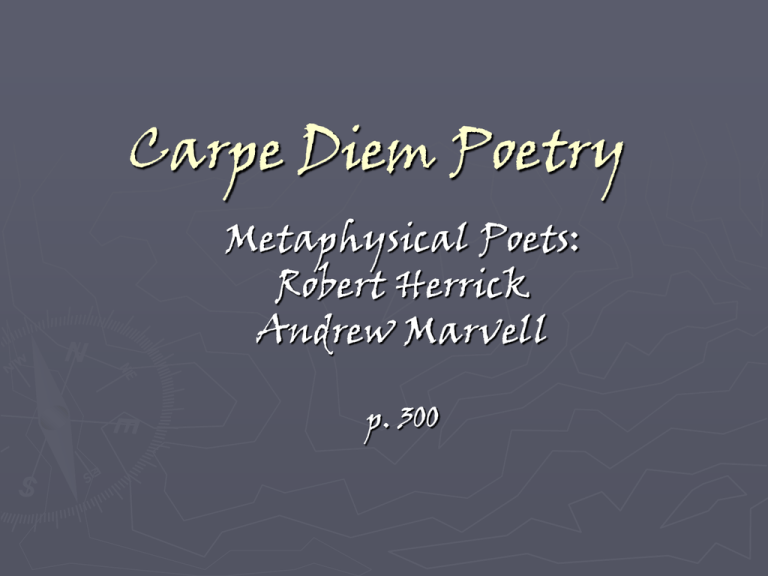
Carpe Diem Poetry Metaphysical Poets: Robert Herrick Andrew Marvell p. 300 Film Clip Dead Poets Society Clip Carpe Diem ► Latin for “seize the day” ► Carpe diem quam minimum credula postero – "Seize the Day, putting as little trust as possible in the next [day]" –Horace, an Epicurean thinker carpere: to pick or pluck “the philosophy of Epicurus who subscribed to a hedonistic ethics that considered an imperturbable emotional calm the highest good and whose followers held intellectual pleasures superior to transient sensualism” (Merriam Webster) ► “YOLO” ► Romans sometimes displayed a human skull at their wild parties as a reminder of the fate no man can escape Robert Herrick 1591-1674 ► Apprenticed to his uncle, a London goldsmith perhaps how he acquired his taste for small, beautiful things ► Did not enter a university until age 22 (very late in that time) and did not leave until 29 showed a lack of ambition and drive ► No regular occupation for the next few years ► Friends with playwright Ben Johnson ► At some point, ordained as a priest ► Serious part of his life began at age 39 ► ► ► Robert Herrick Sent to a parish in Dean Prior in Devonshire went Country referred to as “wretched and barbaric” by Londoners he called Devonshire “dull” and “loathèd”; he even kept a tame pig and taught it to drink from a tall mug he once threw his sermon book at a congregation that had the audacity to look bored 1647 – Cromwell’s army arrived and replaced him with a more puritanical preacher (very unlike Herrick) ► Robert Herrick 1648 - lived in London again and published a volume of about 1,400 poems (Hesperides, or the Works Both Human and Divine of Robert Herrick, Esq.) Hesperides: classic mythological name for collection of nymphs who live in a garden and watch over a tree that bears golden apples; this implies the book is full of precious things Less than a fourth fit into the “divine” category--others are very “human” Herrick may have lived a less lively life than his poetry ► When the king was restored 13 years later, Herrick was reinstated and lived there until he died at age 83 Robert Herrick Entrenched in Latin poetry ► Wrote his poems as if he were an ancient Roman, imposing pagan customs, creeds, and rituals on the English countryfolk and his own household ► Imitated the Latin love poems when he addressed poems to beautiful women with classical names (e.g. Julia, Corinna, Perilla, Anthea, and Electra) ► Robert Herrick ► Other poem topics: his small house, his spaniel named Tracy, the royal family in London, and whatever came to his mind ► Poems overall present idea of “Merrie England,” an ideal, pastoral state where sadness is momentary and pleasure innocent ► Now apparent that he hid his political views behind the guise of pastoral poetry “To the Virgins, to Make Much of Time” “Gather ye rosebuds while ye may” Helios: Greek god who personified the sun; drove his chariot across the sky every day Andrew Marvell ► 1621-1678 ► Son of a clergyman ► Studied at Cambridge University and received an excellent education ► Poet John Milton, who was not easily impressed by other men’s learning said Marvell was “well read in the Greek and Latin classics” ► After receiving his bachelor’s degree, Marvell traveled for several years in Holland, France, Italy, and Spain Andrew Marvell ► Not involved in the Civil Wars of the 1640s (not aligned with Royalists or Parliamentarians) ► 1650 – tutor to heiress Mary Fairfax, daughter of Sir Thomas Fairfax (lord general of the Parliamentary armies) wrote “Upon Appleton House” about one of the Fairfax’s estates, Nun Appleton did not publish this or any of his other poems; wrote only for his friends’ and his own entertainment Andrew Marvell ► ► ► ► After leaving the Fairfaxes, he became tutor to a ward of Oliver Cromwell 1657 – assistant to Cromwell’s secretary of state after a recommendation from John Milton 1659 – active in politics, serving as a member of Parliament for his native city, Hull, until his death 1660 – King Charles II restored and Commonwealth government dissolved had influence with Royalists to save John Milton’s life published verses satirizing political opponents and prose pamphlets on issues of the day Marvell hated the king so much that friends feared he would put them in jeopardy; rumors arose that Marvell was poisoned, but it’s more likely that he died during a fever from lack of medical care ► His housekeeper claimed to be his wife after his death and sold his lyric poems to a publisher Andrew Marvell ► Poetry reflects admirable qualities of Renaissance lyrical poetry ► Witty, ingenious metaphors ► Some poems light and graceful, but many are deeper and more thoughtful ► Referred to as the “most major” of the minor English poets What a Line! Did it hurt when you fell from heaven? Do you believe in love at first sight, or should I walk by again? ► Do I know you? ‘Cause you look a lot like my next girlfriend. ► People call me John, but you can call me TONIGHT. ► I hope you know CPR because you take my breath away. ► I think you need a ticket because you’re looking FINE! ► Are you from Tennessee? You’re the only TEN I SEE! ► Can I have your picture so I can show Santa what I want for Christmas? ► Do your feet hurt from running through my dreams all night? ► ► “To His Coy Mistress” Reading notes ► The word coy comes from the Latin word quietus, meaning “to become quiet.” Today coy suggests a certain deliberate flirtatiousness, a meaning Marvell would not have employed. ► The word mistress at the time this poem was written did not mean a sexual partner like it does today; it was closer to the term girlfriend used now. ► T.S. Eliot praised the “variety and order” of Marvell’s images, noting the “high speed, the succession of concentrated images,” and then way each image magnifies the original idea. He took Marvell’s words “Let us roll all our strength and all / Our sweetness up into one ball” and in “The Love Song of J. Alfred Prufrock” wrote, “To have squeezed the universe into a ball / To roll it towards some overwhelming question . . . ”

